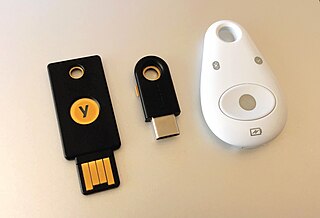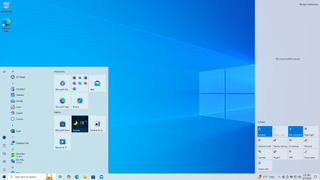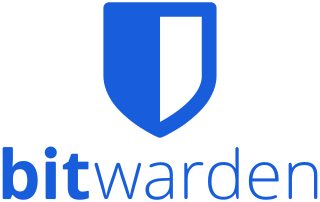
Microsoft Office, or simply Office, is a family of client software, server software, and services developed by Microsoft. It was first announced by Bill Gates on August 1, 1988, at COMDEX in Las Vegas. Initially a marketing term for an office suite, the first version of Office contained Microsoft Word, Microsoft Excel, and Microsoft PowerPoint. Over the years, Office applications have grown substantially closer with shared features such as a common spell checker, Object Linking and Embedding data integration and Visual Basic for Applications scripting language. Microsoft also positions Office as a development platform for line-of-business software under the Office Business Applications brand.

Instant messaging (IM) technology is a type of online chat allowing immediate transmission of messages over the Internet or another computer network. Messages are typically transmitted between two or more parties, when each user inputs text and triggers a transmission to the recipient(s), who are all connected on a common network. It differs from email in that conversations over instant messaging happen in real-time. Most modern IM applications use push technology and also add other features such as emojis, file transfer, chatbots, voice over IP, or video chat capabilities.
An application program is a computer program designed to carry out a specific task other than one relating to the operation of the computer itself, typically to be used by end-users. Word processors, media players, and accounting software are examples. The collective noun "application software" refers to all applications collectively. The other principal classifications of software are system software, relating to the operation of the computer, and utility software ("utilities").
Single sign-on (SSO) is an authentication scheme that allows a user to log in with a single ID to any of several related, yet independent, software systems.
Identity management (IdM), also known as identity and access management, is a framework of policies and technologies to ensure that the right users have the appropriate access to technology resources. IdM systems fall under the overarching umbrellas of IT security and data management. Identity and access management systems not only identify, authenticate, and control access for individuals who will be utilizing IT resources but also the hardware and applications employees need to access.

A security token is a peripheral device used to gain access to an electronically restricted resource. The token is used in addition to, or in place of, a password. Examples of security tokens include wireless key cards used to open locked doors, a banking token used as a digital authenticator for signing in to online banking, or signing transactions such as wire transfers.
MicroStrategy Incorporated is an American company that provides business intelligence (BI), mobile software, and cloud-based services. Founded in 1989 by Michael J. Saylor, Sanju Bansal, and Thomas Spahr, the firm develops software to analyze internal and external data in order to make business decisions and to develop mobile apps. It is a public company headquartered in Tysons Corner, Virginia, in the Washington metropolitan area. Its primary business analytics competitors include SAP AG Business Objects, IBM Cognos, and Oracle Corporation's BI Platform. Saylor is the Executive Chairman and, from 1989 to 2022, was the CEO. It is widely considered to be a bitcoin proxy due to its massive holdings of the cryptocurrency.
Mobile app development is the act or process by which a mobile app is developed for one or more mobile devices, which can include personal digital assistants (PDA), enterprise digital assistants (EDA), or mobile phones. Such software applications are specifically designed to run on mobile devices, taking numerous hardware constraints into consideration. Common constraints include CPU architecture and speeds, available memory (RAM), limited data storage capacities, and considerable variation in displays and input methods. These applications can be pre-installed on phones during manufacturing or delivered as web applications, using server-side or client-side processing to provide an "application-like" experience within a web browser.

WaveMaker is a Java-based low-code development platform designed for building software applications and platforms. The company, WaveMaker Inc., is based in Mountain View, California. The platform is intended to assist enterprises in speeding up their application development and IT modernization initiatives through low-code capabilities. Additionally, for independent software vendors (ISVs), WaveMaker serves as a customizable low-code component that integrates into their products.
Daon is an international biometrics and identity assurance software company founded in 1999 by Irish entrepreneur Dermot Desmond. The name, Daon, was chosen because it stems from the Celtic word for human being, duine daonna. Daon is headquartered just miles outside of Washington, DC in Fairfax, VA. Daon also has major operations in Dublin, located in the International Financial Services Center (IFSC). It has an additional offices in Belgrade, Serbia and Canberra, Australia.

Multi-factor authentication is an electronic authentication method in which a user is granted access to a website or application only after successfully presenting two or more pieces of evidence to an authentication mechanism. MFA protects personal data—which may include personal identification or financial assets—from being accessed by an unauthorized third party that may have been able to discover, for example, a single password.
Mobile Business Intelligence is defined as “Mobile BI is a system comprising both technical and organizational elements that present historical and/or real-time information to its users for analysis on mobile devices such as smartphones and tablets, to enable effective decision-making and management support, for the overall purpose of increasing firm performance.”. Business intelligence (BI) refers to computer-based techniques used in spotting, digging-out, and analyzing business data, such as sales revenue by products and/or departments or associated costs and incomes.
Mobile security, or mobile device security, is the protection of smartphones, tablets, and laptops from threats associated with wireless computing. It has become increasingly important in mobile computing. The security of personal and business information now stored on smartphones is of particular concern.
A mobile application or app is a computer program or software application designed to run on a mobile device such as a phone, tablet, or watch. Mobile applications often stand in contrast to desktop applications which are designed to run on desktop computers, and web applications which run in mobile web browsers rather than directly on the mobile device.

Windows 10 is a major release of Microsoft's Windows NT operating system. It is the direct successor to Windows 8.1, which was released nearly two years earlier. It was released to manufacturing on July 15, 2015, and later to retail on July 29, 2015. Windows 10 was made available for download via MSDN and TechNet, as a free upgrade for retail copies of Windows 8 and Windows 8.1 users via the Microsoft Store, and to Windows 7 users via Windows Update. Windows 10 receives new builds on an ongoing basis, which are available at no additional cost to users, in addition to additional test builds of Windows 10, which are available to Windows Insiders. Devices in enterprise environments can receive these updates at a slower pace, or use long-term support milestones that only receive critical updates, such as security patches, over their ten-year lifespan of extended support. In June 2021, Microsoft announced that support for Windows 10 editions which are not in the Long-Term Servicing Channel (LTSC) will end on October 14, 2025.
Wire is an encrypted communication and collaboration app created by Wire Swiss. It is available for iOS, Android, Windows, macOS, Linux, and web browsers such as Firefox. Wire offers a collaboration suite featuring messenger, voice calls, video calls, conference calls, file-sharing, and external collaboration – all protected by a secure end-to-end-encryption. Wire offers three solutions built on its security technology: Wire Pro – which offers Wire's collaboration feature for businesses, Wire Enterprise – includes Wire Pro capabilities with added features for large-scale or regulated organizations, and Wire Red – the on-demand crisis collaboration suite. They also offer Wire Personal, which is a secure messaging app for personal use.

Bitwarden is a freemium open-source password management service that stores sensitive information, such as website credentials, in an encrypted vault. The platform offers a variety of client applications, including a web interface, desktop applications, browser extensions, mobile apps, and a command-line interface. Bitwarden offers a free US or European cloud-hosted service as well as the ability to self-host.

Microsoft 365 is a product family of productivity software, collaboration and cloud-based services owned by Microsoft. It encompasses online services such as Outlook.com, OneDrive, Microsoft Teams, programs formerly marketed under the name Microsoft Office, enterprise products and services associated with these products such as Exchange Server, SharePoint, and Viva Engage. It also covers subscription plans encompassing these products, including those that include subscription-based licenses to desktop and mobile software, and hosted email and intranet services.
Comparison of user features of messaging platforms refers to a comparison of all the various user features of various electronic instant messaging platforms. This includes a wide variety of resources; it includes standalone apps, platforms within websites, computer software, and various internal functions available on specific devices, such as iMessage for iPhones.







